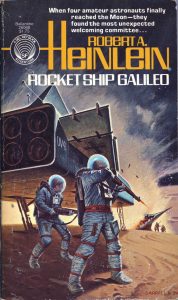 I’ve waited many years to read this one. I began reading Heinlein (with The Star Beast) in 1981. I’ve read most of his work, and, indeed, broke down this year and treated myself to the Virginia Edition, leather-bound copies of all of Heinlein’s work, including non-fiction articles and screenplays.
I’ve waited many years to read this one. I began reading Heinlein (with The Star Beast) in 1981. I’ve read most of his work, and, indeed, broke down this year and treated myself to the Virginia Edition, leather-bound copies of all of Heinlein’s work, including non-fiction articles and screenplays.
But this, his first novel published in book form, and the first of his juvenile novels, was a book that I’d always heard was badly dated and not as entertaining as his others. Now that I’ve finally read it, I disagree. Rocketship Galileo is as captivating, speculative and amusing as any Heinlein adventure (although Starship Troopers was rarely, if ever amusing. That one came from a dark place within the Grandmaster.)
It’s called “dated” less because of the naiveté of the idea that the first expedition to the moon would be the result of a contest for inventors–and particularly teenaged inventors–and more because the villains are–wait for it–Nazis.
Nazis on the Moon. Yeah, it’s pretty cliché. But consider: clichés have to come from somewhere, now don’t they? Heinlein wrote this novel when World War II was a fresh memory, and the idea that a pocket of actual Nazis (not Republicans that have pissed off Democrats) might still be operating somewhere was not as outlandish as it is now. If Heinlein was not the first to introduce Nazis as villains in a post-WWII adventure story, he must have been one of the very earliest.
There is naiveté, and I’m confident RAH himself would agree, in his story’s assumption of world peace and a world government. It harkens back to Heinlein’s more socialist politics in his earliest work, For Us, The Living.
Still, it’s prime Heinlein, and this book is the direct inspiration for John Varley’s amazing “Red Thunder” series, published a decade ago.
A notable and unusual touch is the overtly Jewish character of Morrie. Heinlein didn’t often make a point of identifying his characters’ ethnic backgrounds. The protagonist of Tunnel in the Sky, fans of been told, was black. It’s never mentioned in the book. Juan Rico in Starship Troopers is deliberately hard to pin down, ethnically. Colin Campbell, hero of The Cat Who Walks Through Walls, is noted to be black (well, bi-racial, since his father is a white redhead who shall remain nameless) only in a single line of dialogue: “I’m mighty glad that your skin color matches mine [or] I would be called a racist for the way I despise you.”
Indeed, when Heinlein did make an issue of race, in Farnham’s Freehold, the reception was unfortunate. His attempt to equate slavery and Jim Crow with spiritual cannibalism was misunderstood by many readers, who merely thought he was saying that Africans are genetically predisposed to cannibalism. If you know Heinlein’s writing, you know that kind of sloppy thinking is beneath him.
But Morrie was created at a time when young Jewish readers, probably reeling emotionally after the traumatic events the world had just experienced, might have been encouraged by the reminder that the future included them. I’m not sure why he had so few fellows in Heinlein’s other works. Perhaps editors were afraid of descending into stereotype. I don’t think he did here. When fans talk about making films of Heinlein’s books, I think Rocketship Galileo should be top of the list as a humorous, alternate history period piece.
